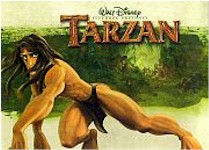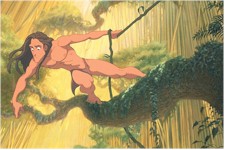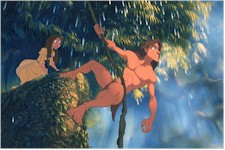|
| |
Tarzan
Review by David Luty
Posted 2 July 1999
 |
|
Directed by Chris Buck and Kevin Lima Starring
the Voices of Brian Blessed,
Joe Whyte, Glenn Close, Minnie Driver,
Tony Goldwyn, Nigel Hawthorne,
Lance Henriksen, Wayne Knight,
Alex D. Linz, Rosie O'Donnell,
Adam Karpel, and Philip Proctor
Written by Edgar Rice Burroughs and Tab Murphy |
It is a story Hollywood has mined since the dawn of
film, one that, in children’s animated form, has the sort of fool-proof plotline
which may at first trouble kids, only to send them into oblivious rapture.
 After a lethal
leopard attack takes his parents (which occurs offscreen), an infant boy stranded in the
jungle is adopted by a family of loving apes, who give him his name. Tarzan (voiced by
Tony Goldwyn) grows up to learn their language and customs, and lives a life of
vine-swinging contentment, save for the nagging unease over his disparate appearance in
the jungle kingdom. Or as one animal friend notes, he’s "freaky-looking."
But before he can beat his chest and yodel into the wind, a monkey wrench comes in the
form of a beautiful young woman named Jane (Minnie Driver), her loving anthropologist
father (Nigel Hawthorne), and their sneering, gorilla-hungry guide (Brian Blessed).
Suddenly, Tarzan doesn’t look so different anymore, and within no time, he’s
communicating with Jane using more than just newly-learned English words. After a lethal
leopard attack takes his parents (which occurs offscreen), an infant boy stranded in the
jungle is adopted by a family of loving apes, who give him his name. Tarzan (voiced by
Tony Goldwyn) grows up to learn their language and customs, and lives a life of
vine-swinging contentment, save for the nagging unease over his disparate appearance in
the jungle kingdom. Or as one animal friend notes, he’s "freaky-looking."
But before he can beat his chest and yodel into the wind, a monkey wrench comes in the
form of a beautiful young woman named Jane (Minnie Driver), her loving anthropologist
father (Nigel Hawthorne), and their sneering, gorilla-hungry guide (Brian Blessed).
Suddenly, Tarzan doesn’t look so different anymore, and within no time, he’s
communicating with Jane using more than just newly-learned English words.
Edgar Rice Burrough’s Tarzan character has strong echoes of Rudyard Kipling’s
The Jungle Book, but the Disney animated versions of the two nature boys are
significantly different animals. Tarzan is the considerably more serious-minded
effort, and at the same time the less mythic one. Where in The Jungle Book, the
child Mowgli is in danger from animals fearing what he may become as a grown man, thus
speaking not towards individual examples of unsympathetic humans, but the very nature of
mankind, the Disney version of the ape man story allows its emotional core to be dominated
by a rather conventional episode of nature invaded by a single man, the evil gorilla
hunter. Such unfavorable comparisons may be due to the natural superiority of Kipling as
an artist over Burroughs, but the Disney filmmakers don’t seem all that interested in
providing any dramatic transcendence of their own. The story of Tarzan presented here has
been strip-mined down to its very basic premise, to the point where the movie never
becomes much more than premise. Me Tarzan, you Jane, and that’s that. The filmmakers,
understandably, are more interested in showing off their technical virtuosity by
concentrating on Tarzan showing off, with some admittedly rousing vine-swinging,
tree-leaping montages and elaborate chase scenes. But the relationships get short shrift.
When we do get to see Tarzan with his closest emotional connection, his ape mother Kala
(Glenn Close), or with the headstrong but soft-hearted Jane (Minnie Driver), or the stern,
quiet, disapproving alpha male gorilla Kerchak (Lance Henrickson), Tarzan the movie really
soars. But for much of the time, Tarzan seems to be flying to pass the time.
Kids may very well not give a hoot about any such shortcomings. The roller coaster,
playground kinetics of the jungle environment are thrillingly executed, and the overall
look of the film is stunningly lush, allowing viewers of any age to get lost in its richly
colored density. Nevertheless, young ones may wish for the movie to be a bit more fun and lively than it
actually is. The comic relief characters, such a consistent staple of Disney animation,
are a bit less funny and more marginal to the story than usual. Turk (Rosie
O’Donnell), Tarzan’s emotion-repressing gorilla buddy, is overwhelmed by
O’Donnell’s New Yorker personality, to the point where O’Donnell’s
voice becomes most of the joke, and the Wayne Knight-voiced elephant Tantor barely makes
an impression at all, despite some considerable screen time. Additionally, Tarzan is
Disney’s first traditionally animated feature in nine years that is not, strictly
speaking, a musical, in that its music is never sung by the characters. Phil Collins does
the honors, with a hushed power in the opening number, "Two Worlds," but with a
consistent lack of energy throughout. Love him or hate him, Collins has always had a
solemn, brooding, detached presence as a singer - kid-friendly he is not. That may have
been the trade-off the Disney filmmakers thought necessary to give their story of Tarzan
some additional gravity, but they would have been better served looking for gravity within
Tarzan himself, and by creating a more compelling situation for him to endure.
Nevertheless, young ones may wish for the movie to be a bit more fun and lively than it
actually is. The comic relief characters, such a consistent staple of Disney animation,
are a bit less funny and more marginal to the story than usual. Turk (Rosie
O’Donnell), Tarzan’s emotion-repressing gorilla buddy, is overwhelmed by
O’Donnell’s New Yorker personality, to the point where O’Donnell’s
voice becomes most of the joke, and the Wayne Knight-voiced elephant Tantor barely makes
an impression at all, despite some considerable screen time. Additionally, Tarzan is
Disney’s first traditionally animated feature in nine years that is not, strictly
speaking, a musical, in that its music is never sung by the characters. Phil Collins does
the honors, with a hushed power in the opening number, "Two Worlds," but with a
consistent lack of energy throughout. Love him or hate him, Collins has always had a
solemn, brooding, detached presence as a singer - kid-friendly he is not. That may have
been the trade-off the Disney filmmakers thought necessary to give their story of Tarzan
some additional gravity, but they would have been better served looking for gravity within
Tarzan himself, and by creating a more compelling situation for him to endure.
What they really should have done, was take a lesson from The Jungle Book. In The
Jungle Book, you get the emotional resonance, and Louis Prima.
Contents | Features | Reviews
| Books | Archives | Store
Copyright © 1999 by Nitrate Productions, Inc. All
Rights Reserved.
| |
|